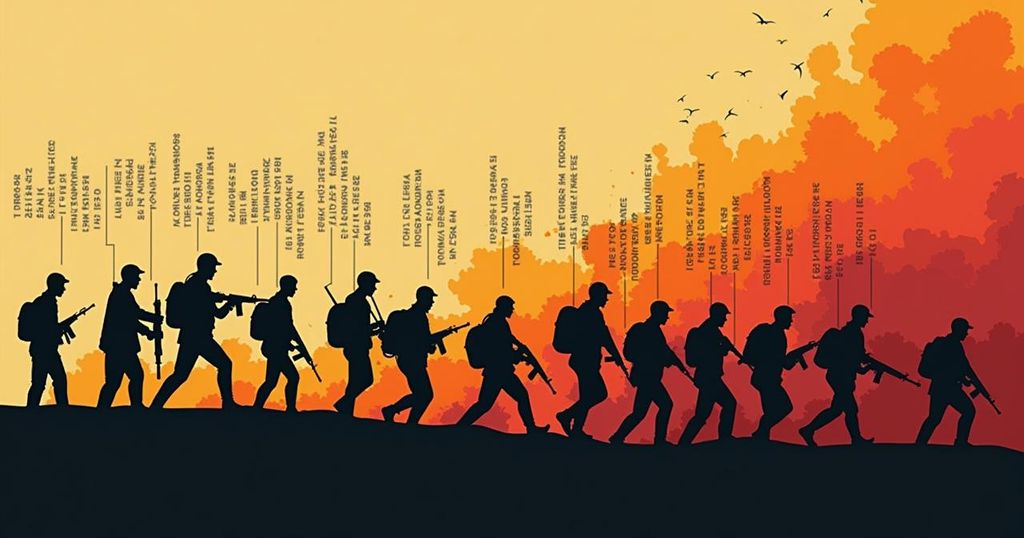Hezbollah and Israel: An Ongoing Conflict Timeline
The conflict between Hezbollah and Israel has intensified following a recent attack in which hand-held pagers belonging to Hezbollah operatives exploded, causing widespread injuries and fatalities. Historically rooted in the 1982 Israeli invasion of Lebanon, this ongoing animosity has seen numerous military confrontations, particularly as Hezbollah responds to Israeli actions in Gaza. The historical context of this conflict, coupled with the current geopolitical climate involving Iran, underlines the precarious nature of security in the region.
The ongoing conflict between Hezbollah and Israel has witnessed a significant escalation following a recent attack involving the explosion of hand-held pagers used by Hezbollah operatives in Lebanon. This incident, which resulted in the injury of approximately 2,800 individuals and the deaths of at least nine people, including three children, underscores the perennial hostilities between the two factions. Hezbollah has attributed this incident to Israeli actions, marking the latest incident in a long-standing pattern of violence that has persisted for nearly five decades. Tensions escalated notably after Hezbollah commenced military operations against Israel in October 2023, which were initiated in response to Israel’s military actions in Gaza that claimed thousands of lives. Historically, the animosity between Israel and Hezbollah dates back to the Israeli invasion of Lebanon in 1982, which was partly motivated by attacks from the Palestine Liberation Organization (PLO). The conflict has since evolved through various phases, including Hezbollah’s promise to defend Lebanese sovereignty against Israeli incursions, a series of military engagements referred to in Israeli operations and regional warfare. As relevant incidents have accumulated, including the 2006 July War and the involvement of Hezbollah in the Syrian civil war, the security dynamics in the region remain volatile. In the latest turn, Israeli retaliatory measures include strikes and targeted operations within Lebanese territory. This conflict reflects broader geopolitical tensions, where external actors such as Iran also play crucial roles in shaping the strategies and responses of Hezbollah. The situation remains precarious, with the likelihood of retaliatory actions looming in light of recent escalations, including the significant pager attack in September 2024, for which Hezbollah has vowed retaliation against Israel.
The conflict between Hezbollah and Israel is rooted in complex historical narratives and geopolitical dynamics that have evolved since the early 1980s. Initially catalyzed by Israel’s invasion of Lebanon aimed at quelling PLO militancy, the ensuing interactions have led to profound consequences for both nations. Hezbollah emerged as a formidable entity within Lebanese territory, adopting a resistance stance against Israeli military advances. Over the decades, the conflict has morphed through distinct phases marked by major military engagements, political maneuvering, and occasional ceasefires, influenced by shifting alliances and the rise of regional players including Iran. Hezbollah’s integration into Lebanese politics has solidified its power, rendering it not only a militant organization but also a significant political force. Understanding the historical context provides critical insights into ongoing tensions, marked by cycles of violence and retaliatory measures between Hezbollah and Israel.
In conclusion, the unfolding events between Hezbollah and Israel illustrate a continued cycle of violence characterized by longstanding grievances and complex geopolitical rivalries. The recent pager explosion is merely the latest manifestation of these escalating tensions, which are reflective of deeper historical enmities. Both sides appear poised for further conflict, with Hezbollah’s commitment to retaliate against Israel further entrenching the cycle of aggression. As regional stability hangs in the balance, the international community watches closely, aware that any miscalculation could lead to broader conflict.
Original Source: www.aljazeera.com




Post Comment